- Home
- McBain, Ed
Killer's Payoff Page 8
Killer's Payoff Read online
Page 8
“Once. Sy was drivin’ by with her in the Caddy. I waved to him, and he stopped to say hello. He introduced her.”
“She claims she knew nothing about his business. Do you buy that, Torr?”
“I buy it. Who says a woman needs brains? All the brains she needs is right between—”
“That makes two of you who didn’t know anything about Sy’s business.”
“I figured he had something big going for him,” Torr said. “He had to. A guy don’t come into a couple of cars and a new pad and clothes to knock your eyes out unless he’s got something big going for him. I don’t mean penny-ante stuff, either. I mean big.”
“What do you consider penny-ante?”
“Pin money. You know.”
“No, I don’t. What’s pin money?”
“A couple of bills a month, you know. Hell, you can tell me better than I can tell you. How much was he getting from his marks?”
“Enough,” Kling said.
“I don’t mean the big marks, I mean the small ones,” Torr said.
“How do you know there are big ones and small ones?”
“I’m just guessing,” Torr said. “I figure the big ones set him up with the cars and the pad. The small ones buy his bread. Ain’t I right?”
“You could be.”
“Sure. So what can you expect from a small mark? Two, three bills? Five grand in a lump? It’s the big ones that count.”
“I guess so,” Kling said.
“Do you know who the ones are yet?”
“No.”
“The small ones?”
“Maybe.”
“How many small ones are there?”
“You should have been a cop, Torr.”
“I’m only interested in seeing justice done. Sy was my friend.”
“Justice will triumph,” Kling said. “I’m busy. If you’re finished, I’d like to get back to work.”
“Sure,” Torr said. “I didn’t mean to disturb you.”
And he left.
THE CALL FROM Danny Gimp had told Carella that the informer had something for him, could they meet someplace away from the precinct? It had been Carella’s policy—up to the day of his idiocy—to give his home-phone number to no one but relatives, close friends, and of course the desk sergeant. He did not encourage business calls at home. It was annoying enough to be called there by the squad; he did not want crime detection or law enforcement to intrude on his off-duty hours. He had broken this rule with Danny Gimp.
The working arrangement between a cop and a stool pigeon is—even with men who bear no particular fondness for each other—a highly personal one. Crime detection is a great big horse race, and you choose your jockeys carefully. And a jockey working for your stable does not report your horse’s morning running-time to the owner of a rival stable. The bulls of the 87th worked with various stoolies, and these stoolies reported to them faithfully. The transaction was a business one, pure and simple—information for money. But a certain amount of trust and faith was involved. The policeman trusted the stoolie’s information and was willing to pay for it. The stoolie trusted the policeman to pay him once the information had been divulged. Cops were averse to working with pigeons they did not know and trust. And likewise, pigeons—whose sole source of income was the information they garnered here and there—were not overly fond of displaying their wares before a strange cop.
A call from the stoolie to the squad was generally a call directed at one cop and one cop alone. If that cop was off-duty or otherwise out of the office, the stoolie would not speak to anyone else, thanks. He would wait. Waiting could sometimes result in a lost collar. Waiting, in a homicide case, could sometimes result in another homicide. And so Danny Gimp had Carella’s home-phone number, and it was there that he called him when the desk sergeant informed him Carella was off that day.
The men arranged to meet at Plum Beach in River-head. Carella told Danny to bring along his swimming trunks.
They lay side by side on the sand like two old cronies who were discussing the bathing beauties. The sun was very strong that day.
“I hope you don’t mind my not wanting to come to the precinct,” Danny said. “I don’t like to be seen there too often. It hurts my business.”
“I understand,” Carella said. “What have you got for me?”
“The background on Sy Kramer.”
“Go ahead.”
“He’s been living big for a few years, Steve, but not as big as just before he got it. You know, he had a nice pad and a good car—a Dodge—but nothing like the new joint, and nothing like the Caddy, you dig?”
“I dig.”
A boy ran by, kicking sand in Carella’s face.
“I used to be a ninety-seven-pound weakling,” Carella said, and Danny grinned.
“Okay,” Danny said. “In September, he goes berserk. Spends like a drunken sailor. Two new cars, clothes, the new pad. This is when he picks up the O’Hara bitch. She’s impressed by loot, what dame isn’t? She moves in with him.”
“How’d he meet her?”
“How’d she say?”
“She said she’s a dancer, met him in a drugstore.”
“For the birds,” Danny said. “She did a crumby strip in a joint on The Stem. Half her salary came from conning guys into buying her colored water.”
“Prostitution?”
“Not from what I could gather, but I wouldn’t put it past her. She’s quite a looker, Steve. They billed her as Red Garters.”
“That’s a name for a stripper, all right.”
“Well, she’s got this flaming-red hair. Anyway, her act stunk. All she had was a body. The less dancing she did, the quicker she got her clothes off, the better it was for everybody concerned.”
“So she met Kramer and latched onto him,” Carella said.
“Right. I think she read the writing on the wall. She was getting pawed by a hundred strangers a night for peanuts. She figured she might as well get pawed by only one guy, and live in luxury.”
“You’re a cynic, Danny,” Carella said.
“I read the cards,” Danny said, shrugging. “Anyway, Kramer hit it big in September.”
“How?”
“That’s the one thing I don’t know.”
“Mmm,” Carella said.
“I take it you know all this already? I ain’t giving you nothing new.”
“Most of it,” Carella said. “I didn’t know about the girl. What else have you got?”
“A hunting trip.”
“Kramer?”
“Yes.”
“When?”
“Beginning of September. It was after he come back that he started throwing the green around. Think there’s a tie-in?”
“I don’t know. Has he got a rep as a hunter?”
“Rabbits, birds, stuff like that. He’s never shot a tiger, if that’s what you mean.”
“Where’d he go on this trip?”
“I don’t know.”
“Did he go alone?”
“Yes.”
“Are you sure it was a hunting trip?”
“Nope. It could have been anything. For all I know, he could have gone to Chicago and rubbed somebody. Maybe that’s where he got the lump of dough.”
“Did he come back with the money?”
“No. Unless he was real cool with it and didn’t start flashing it around. The trip was in the beginning of the month. He didn’t start spending until the end of the month.”
“Was the money hot, do you suppose?”
“Not the way he spent it, Steve. If it was hot, he’d have used a money changer and taken a loss.”
“How do you know he didn’t?”
“I checked the guys buying hot bills. Kramer didn’t go to see any of them. Besides, we’re forgetting something.”
“What?”
“His racket. He’s an extortionist. True, he may have decided to do a quick rub job for somebody, but you don’t hire a shakedown artist for a torpedo jo
b. Besides, like I told you, this torpedo crap went out in the—”
“Mmm, maybe you’re right,” Carella said. “But he could have carried hot ice or furs—”
“He ain’t a fence, Steve. He’s a shakedown artist.”
“Still.”
“I don’t buy it. Maybe this hunting trip was a cover. Maybe he went to see a mark.” Danny shrugged. “Wherever he went, it netted him a big pile of bills.”
“Maybe he really did go on a hunting trip,” Carella said. “Maybe the trip and the dough have no connection.”
“Maybe,” Danny said.
“But you don’t know where he went, is that right?”
“Not a glimmer.”
“And he went alone?”
“Right.”
“Was this before he met the O’Hara girl?”
“Yes.”
“Think she might know something about it?”
“Maybe.” Danny smiled. “Guys have been known to talk in their sleep.”
“We’ll check her again. You’ve helped, Danny. How much?”
“I don’t like to hit you too hard, Steve. Especially when I didn’t give you so much. But I’m slightly from Brokesville. Can you spare a quarter of a century?”
Carella reached for his wallet and gave Danny two tens and a five.
“Thanks,” Danny said. “I’ll make it up to you. The next one’s on the house.”
They lay on the sand for a little while longer. Carella went into the water for a quick dip, and then they went back to the locker rooms. They shook hands, and left each other at three in the afternoon.
LOVE, FLEETING CHIMERA that it is, was hardly present at all the second time Cotton Hawes called upon Nancy O’Hara. In fact, aside from their use of first names in addressing each other, one hardly could have guessed they’d shared the most intimate of intimacies. Ah, love. Easy come, easy go.
“Hello, Nancy,” he said when she opened the door. “I hope I didn’t catch you at a bad time.”
“No,” she said. “Come in, Cotton.”
He followed her into the living room.
“Drink?”
“No. Thanks.”
“What is it, Cotton? Have you found the murderer?”
“Not yet A few more questions, if you don’t mind.”
“Not at all.”
“Were you a stripper?”
Nancy hesitated. “Yes.”
“Anything else?”
“No.”
“Okay.”
“Thanks. I’m glad I have your seal of approval.”
“Why’d you lie?”
“A dancer sounds better than a stripper. I’m a lousy dancer, and a worse stripper. Sy wanted me to live with him. So I lived with him. Is there something so terrible about that?”
“I guess not.”
“Don’t get moral, Cotton,” she told him. “You weren’t very goddamn moral in bed.”
“True.” He grinned. “End of sermon. End of shocked Daughter of American Revolution routine. Beginning of important questions.”
“Like what?”
“Like Kramer. Did he ever mention a hunting trip to you?”
“Yes.” She paused. “I told you. Hunting was one of his hobbies.”
“A hunting trip in September?”
“Yes.” Again, she paused. “Before we met. Yes, he mentioned it.”
“Did he really go hunting?”
“I think so. He talked about the stuff he’d shot. A deer, I think. Yes, he really went hunting.”
“Where?”
“I don’t know.”
“Did he go hunting again while you were living with him?”
“Yes. I already told you this. He went several times.”
“But you don’t know where he went that time in September?”
“No.”
Hawes thought for a moment. Then he said, “Would you happen to know if Kramer had a gasoline credit card?”
“A what?”
“A credit card. To show at service stations. So that he could charge his gas.”
“Oh. I don’t know. Would he carry that with him?”
“Yes.”
“Well, the police still have his wallet. Why not look through it?”
“We will,” Hawes said. “Did Kramer save bills?”
“You mean grocery bills and things like that?”
“No. I mean telephone bills, electric-light bills, gasoline bills. Things like that.”
“Yes. Why, yes, he did.”
“Where did he keep them?”
“In the desk in the foyer.”
“Would they still be there?”
“I haven’t touched anything,” Nancy said.
“Good. Mind if I look through the desk?”
“Not at all. What are you looking for, Cotton?”
“Something that might be just as good as a road map,” he answered, and he went out to the foyer and the desk.
9.
SY KRAMER had a card with the Meridian Mobilube Company that enabled him to charge his automobile expenses at any of their gasoline stations. Most of the bills in his desk for gasoline charges had been signed at a place called George’s Service Center in Isola. George’s, the police discovered after a check of the phone book, was a station three blocks from Kramer’s apartment. He had undoubtedly been a regular customer there and most of his gas purchases had originated there. The bills he had signed looked like this:
On September first, Kramer had started a trip. The first bill for that date came from George’s, in Isola. Kramer had put thirteen gallons of gasoline and a quart of oil into the car. A check with the manufacturer of Kramer’s 1952-model automobile revealed that the tank capacity of the car was seventeen gallons, and that the car could be expected to travel between fifteen and sixteen miles on a gallon of gasoline. The bills Sy Kramer signed that day seemed to back up the manufacturer’s word. Kramer had apparently kept a careful eye on his tank gauge. Approximately every hundred miles, when the gauge registered half-empty, he had stopped and brought it up to full again, signing a credit slip for the gas. Each bill was stamped with the name of the gas station and the town.
Sy Kramer had unmistakably gone to the Adirondack Mountains in New York State.
Using a road map, Hawes traced Kramer’s progression across that state, marking each town for which he had a bill. The last place in which Kramer had stopped for gas on September first was called Gloversville. From that town, the mountain territory spread north. From that town, he could have gone anywhere in the Adirondacks; he had not signed another bill for gasoline that day. Hawes marked Gloversville with a big circle, and then he consulted the bills once more.
On September eighth, a week later, Kramer had put five gallons of gasoline and a quart of oil into the car. He had made the purchase in a town called Griffins. The rest of the bills for September eighth recorded a southbound trip that eventually led back to the city. The stop in Griffins had apparently been the first stop for gas on the leg home. The town north of Griffins was Bakers Mills. It seemed possible to Hawes that Kramer had gone into the mountains somewhere between Griffins and Bakers Mills. He circled both towns. It seemed likely, too, that Griffins had been the first town he’d hit after coming out of the mountains, gassing up there for the first lap of the trip home.
His calculations could, he admitted, be wrong. But the distance from Gloversville to Griffins was an approximate thirty-five miles. Kramer had filled his tank in Gloversville. Figuring fifteen miles to the gallon, Kramer would have used a little more than two gallons to make the trip from Gloversville to Griffins. Could Hawes safely assume Kramer had then traveled another approximate fifteen miles into the mountains, and an additional fifteen miles for the return trip to Griffins, where he had added five gallons of gas to the tank?
It was possible that Griffins had been his springboard into the mountains. It was a long shot, but it was possible.
One thing was certain. Kramer was either a liar or a habitual la
wbreaker. He had told Nancy O’Hara he’d shot a deer.
A check with one of the state’s game protectors revealed that the Adirondack deer season did not start until October twenty-fifth.

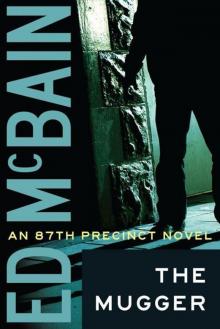 87th Precinct 02 - The Mugger
87th Precinct 02 - The Mugger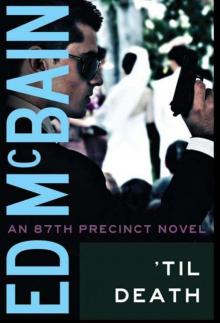 87th Precinct 09 - Til Death
87th Precinct 09 - Til Death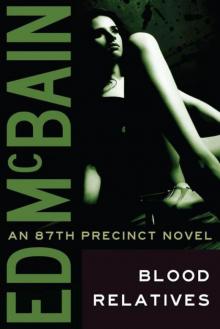 Blood Relatives (87th Precinct)
Blood Relatives (87th Precinct) Killer's Payoff
Killer's Payoff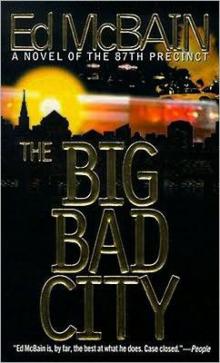 The Big Bad City
The Big Bad City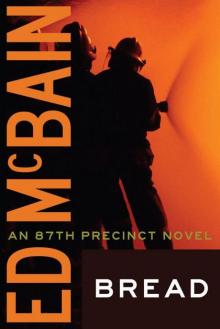 Bread (87th Precinct)
Bread (87th Precinct)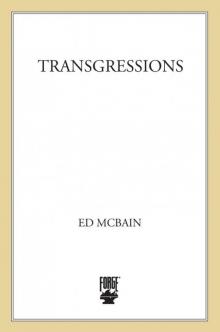 Transgressions Vol. 3
Transgressions Vol. 3 Runaway
Runaway So Long As You Both Shall Live (87th Precinct)
So Long As You Both Shall Live (87th Precinct) Killer's Wedge
Killer's Wedge